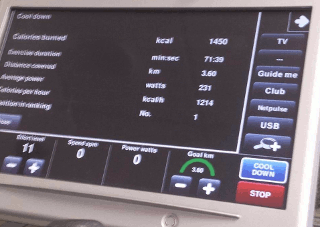Hitting the Gym
18 March 2016When I changed companies just under a year ago, I decided to make it coincide with major life-style changes, and one of those was building a get-fit regime into my usual routine. Below is a collection of things I wrote during this time, and have decided to publish before they go to waste. There are contradictions, and some of the views below are actually outright wrong, but it is representative of the psychological changes that happened as part of the process.
All about calorie deficit
Each kilogram of fat corresponds to around 7,000 calories, so simple maths means losing 1kg means your body using 7,000 more calories over a set period of time than it receives in food & drink. The bigger the deficit, the bigger the weight loss. Doing this via dieting is ineffective because it involves having an intake within quite a narrow range, influenced by two major things:- Base-line metabolism
- The body needs around 1,500-2,500 calories daily to maintain itself and allow you to do basic functions.
- Starvation dieting
- Eat less than around 1,000 calories, and your body starts doing things you don't want it to do.
- Porton control is a non-starter
- Unless you want to be anti-social and never eat with colleagues, a lot of the time you have no actual control. Decades of guilt-tripping by teachers about having food that those in Abyssinia don't means that people are conditioned to consider not finishing food as bordering on sin. You either eat the whole meal or don't eat it at all.
- Calories are not where you expect them
- A 250ml glass of orange juice has more calories than two rashers (50g) of bacon. Having to think about the number of calories in everything you consume, you have to think more about food at a time you should be thinking less.
The regime
Going to the gym 5-9 times a week, or in other words most days and sometimes more than once a day. My favoured machine seems to be a cross between a stepper and cross-trainer, and I would typically do 2km (later 3km) but have gone higher on a few occasions. For a significant length of time I was routinely getting up on weekdays at 04:45 and getting back around 19:00. By any measure this was brutal.

What to eat?
When I first started I was already on one major meal a day, and I maintained this as my lunch was both my daily treat and the time I got to talk to my then-new coworkers about non-work things. It was not exactly the best of things to eat, being rather biased towards various forms of meat & potatoes, but at least it was not the type of thing seen on ThisIsWhyYou'reFat.com. At the time I decided that if I did not include myself some slack I would go insane, and in any case I was losing weight at fast rate anyway.After a while when the effects of exercise start to become significant, in comes the motivation to reinforce these gains by further dietary modifications. At first it might be switching from sugar to sweetener for coffee/tea/cocoa, but later on the bigger changes come in. It was around six months in that I switched over to having simple soup for lunch, and since then tweaked around with various combinations of breakfasts & dinners.
In hindsight diet becomes more important the closer to the target weight, particularly when shape rather than kilogram-reduction becomes the priority. However I still hold the view that dieting is a waste of time, because a diet-led weight reduction regime is both depressing and ineffective.
Empty stomach workouts
It is controversial, but I personally subscribe to the idea of doing a morning cardio workout on an empty stomach, at least for the first 2-3 months. Basic idea is that overnight low blood-sugar levels cause Glycogen stores to be depleted, and with insulin levels also low, the body will be more inclined turn to fat reserves for energy. Exercising with low insulin levels also tends to increase insulin sensitivity, which goes some way to alleviating the type-2 Diabetes risk associated with being overweight.The major practical down-side is that the body might not actually have the energy for a particularly vigorous workout, and in cases can make people feel faint. I have on occasion found that I have had to stop at a point that I know I have easily passed many times before, and this is particularly noticeable with resistance training. Other down-side is that at low-Glycogen levels the body will also start consuming protein (i.e. muscles) to get energy, which I initially considered an acceptable side-effect.
Bringing in the weights
My own view is that cardio is all about getting body mass down due to its far higher raw calorie burn, whereas resistance training (i.e. weights) is all about shape. The original motivation for bringing in resistance training was to offset any muscle-loss that the cardio sessions might result in, but in the longer term particularly as I approached my target mass, it was clearly better for the type of all-body fitness I was really after. Unlike intense cardio, resistance training targets more than just the leg muscles.I eventually settled on morning workouts almost always being cardio due to the difficulty of doing a proper early-morning workout without having eaten much (if at all), and afternoon workouts usually being resistance most weeks due to the lower time requirement. Tweaking is as much about avoid monotony as getting a good balance of exercise types.